
Lisa Grossman is the astronomy writer for Science News. Previously she was a news editor at New Scientist, where she ran the physical sciences section of the magazine for three years. Before that, she spent three years at New Scientist as a reporter, covering space, physics and astronomy. She has a degree in astronomy from Cornell University and a graduate certificate in science writing from UC Santa Cruz. Lisa was a finalist for the AGU David Perlman Award for Excellence in Science Journalism, and received the Institute of Physics/Science and Technology Facilities Council physics writing award and the AAS Solar Physics Division Popular Writing Award. She interned at Science News in 2009-2010.

Trustworthy journalism comes at a price.
Scientists and journalists share a core belief in questioning, observing and verifying to reach the truth. Science News reports on crucial research and discovery across science disciplines. We need your financial support to make it happen – every contribution makes a difference.
All Stories by Lisa Grossman
-
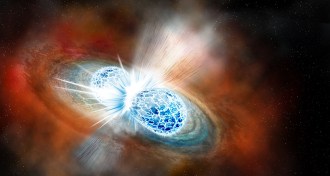 Cosmology
CosmologyWhat detecting gravitational waves means for the expansion of the universe
The latest LIGO signal proves that gravitational waves travel at the speed of light, ruling out a swath of cosmological theories in the process.
-
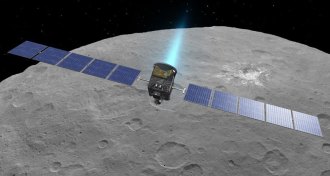 Astronomy
AstronomyDawn spacecraft will keep orbiting the dwarf planet Ceres indefinitely
NASA just gave the Dawn spacecraft a second mission extension to orbit Ceres indefinitely.
-
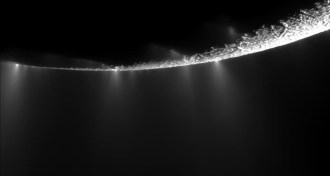 Astronomy
AstronomyHere’s what space toilets can teach us about finding signs of alien life
Lessons learned from flushing space toilets can help researchers plan life-hunting missions to icy moons.
-
 Astronomy
AstronomyMeasured distance within the Milky Way gives clues to what our galaxy looks like
Astronomers used an old but challenging technique to directly measure the distance to a star on the opposite side of the galaxy for the first time.
-
 Astronomy
AstronomyMeasured distance within the Milky Way gives clues to what our galaxy looks like
Astronomers used an old but challenging technique to directly measure the distance to a star on the opposite side of the galaxy for the first time.
-
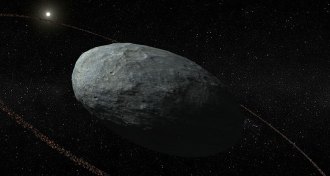 Astronomy
AstronomyOddball dwarf planet Haumea has a ring
The dwarf planet Haumea is now the most distant ringed object spotted in the solar system.
-
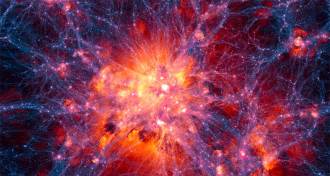 Astronomy
AstronomyHow to make the cosmic web give up the matter it’s hiding
Half the ordinary matter in the universe is unaccounted for. Astronomers may now have a new way to see it spanning the space between galaxies.
-
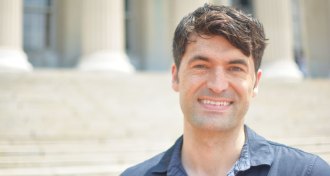 Astronomy
AstronomyDavid Kipping seeks new and unexpected worlds
Astronomer David Kipping became “the moon guy” by deciding no idea is too crazy.
-
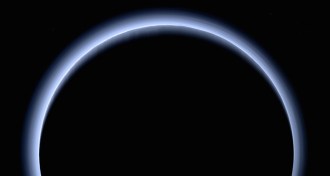 Astronomy
AstronomyWhy it’s good news that Pluto doesn’t have rings
The New Horizons team searched for rings around Pluto, and found nothing. That suggests the spacecraft’s next destination might be ring-free too.
-
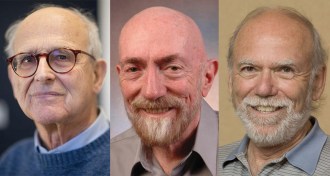 Physics
PhysicsTrio wins physics Nobel Prize for gravitational wave detection
Pioneers of LIGO collaboration win for finding spacetime ripples from two spiraling black holes.
-
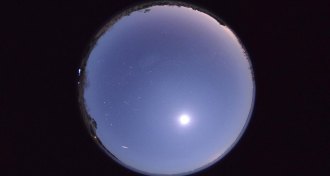 Astronomy
AstronomyHow a meteor shower helped solve the case of the vanishing comet
A missing comet has been linked to a long-lost meteor shower, helping astronomers recover both.
-
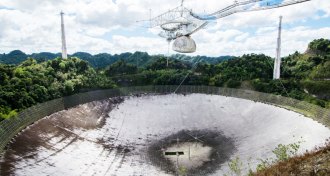 Astronomy
AstronomyNew questions about Arecibo’s future swirl in the wake of Hurricane Maria
The iconic Arecibo Observatory was damaged in Hurricane Maria, but not as much as originally thought. But its funding is still in doubt.